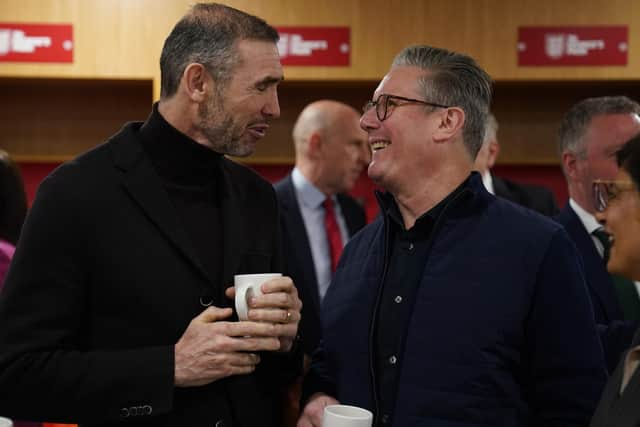Schools are increasingly shouldering the burden of sports delivery, why aren't sports more accessible outside of school? - Jayne Dowle
A successful team, Shankley argued, was made up of everyone working together for the common good. In the hostile environment of today’s political arena, the old-fashioned purity of this aim – Shankley was Liverpool manager from 1959 to 1974 - might sound like a pipe dream, smashed to pieces by the third decade of the 21st century.
However, whilst he certainly can’t turn back the clock, Starmer is determined to make football, and sport in general, a centrepiece of Labour’s appeal to voters disenchanted with corrosive Conservatism.
Advertisement
Hide AdAdvertisement
Hide AdNew analysis by the Labour party of Sports England data shows a gulf in sports participation between state and independent schools. Many of us who have children with sporting interests – my 21-year-old son has played football since he was four – could have told Labour that this has been the case for years.


However, sports participation is now afforded greater significance than promoting teamwork, mental and physical agility and interest in healthy lifestyles. It’s – excuse the pun – set to become a political football as the General Election approaches.
In 2022/23, almost three-quarters, 72 per cent, of children at an independent school took part in a team sport at least once a week in school, compared to just 52 per cent of state school pupils, Labour has found. The gap in participation has widened since 2017, increasing by two-thirds in six years.
In the last year, the number of taught PE hours in state schools has fallen by 5,000, contributing to an overall decline of 45,000 since November 2010. Before we rush to blame the pandemic for this, children being out of school for months on end is one thing, state schools struggling to fund and timetable active teaching – and this includes dance and drama – is quite another.
Advertisement
Hide AdAdvertisement
Hide AdThe point is, whilst school can be a starting point for spotting and encouraging sporting ability, it’s not the only route. Sadly, cash-strapped local councils have been forced to close or mothball local sports centres, or sell off playing fields for new houses. Unless the odd community-based initiative manages to secure meagre funding, schools are increasingly shouldering the burden of sports delivery and provision, and most simply don’t have the capacity to do so.
Meanwhile, independent schools, buffered by annual fees that can now easily top £50,000 per year, per pupil, are falling over themselves to invest in new cricket pitches, build climbing walls and yoga studios and generally compete to attract the parents with the deepest pockets.
Starmer warns that the decline in state school sports provision means that “young people are being locked out of emulating their heroes”.
The Olympics in Paris will perhaps capture the imagination, but only if Team GB produces the kind of folk heroes we can all get behind.
Advertisement
Hide AdAdvertisement
Hide AdHis concern perhaps comes back to football, especially with the prospect of Euro 2024, starting in the middle of June, hosted by Germany.
How will England and Scotland’s homegrown heroes fare? Some may argue that the actions of 11 men on a pitch should have nothing to do with the serious business of politics.
As a football fan, to a point, I would agree. I heard a commentator on the radio this week blaming the bad behaviour of England fans on the growing disinclination of the nation to celebrate St George’s Day on April 23, because the red and white flag has become besmirched with certain political leanings. The truth is far more complicated than that and goes way beyond football.
However – especially with the success of the England women’s team – at least the dream of a professional career playing football is not entirely out of reach for a talented kid from a modest background.
Advertisement
Hide AdAdvertisement
Hide AdBut let’s just say, that with a few outstanding exceptions, this only happens if that kid has supportive parents or other trusted adults to drive them to practise and matches up and down the country, pay for kit and private coaching, and possesses formidable diplomacy and perseverance to navigate all the other pushy parents trying to get their child noticed.
So whilst Starmer’s affinity with football – he still plays Sunday League - comes from a genuine place, I hope he doesn’t get too carried away. It’s worth remembering that other team sports are far more elitist than the beautiful game.
In cricket’s most recent World Cup, according to official figures, out of an England squad of 30, of the 28 players educated in this country, only 12 did not go to independent schools at all, so 57 per cent were privately educated.
Comment Guidelines
National World encourages reader discussion on our stories. User feedback, insights and back-and-forth exchanges add a rich layer of context to reporting. Please review our Community Guidelines before commenting.
